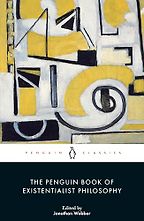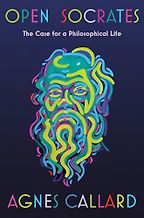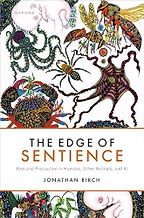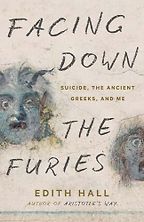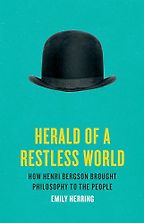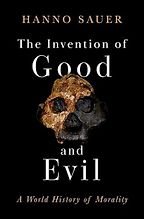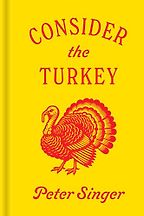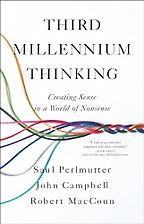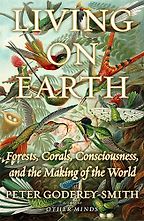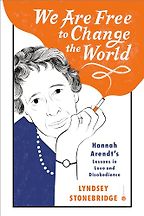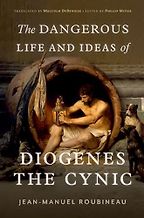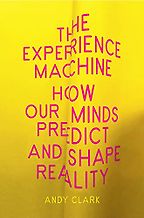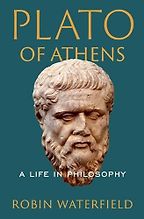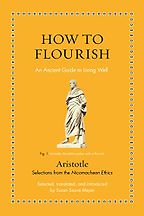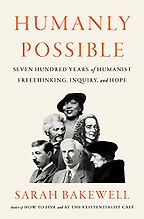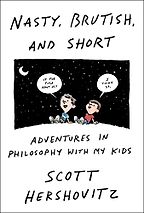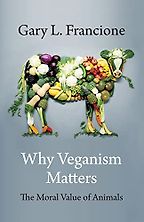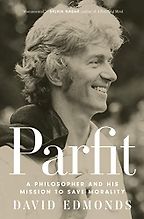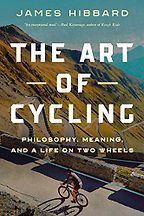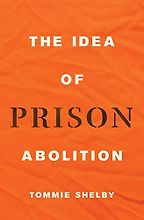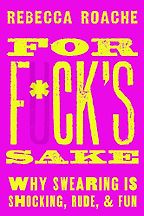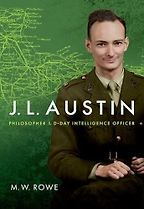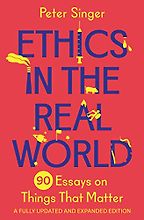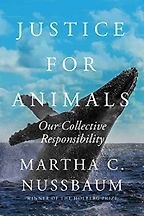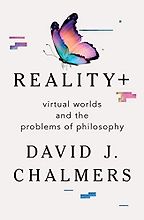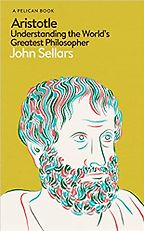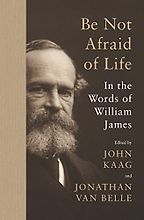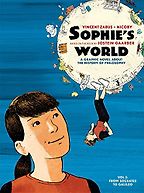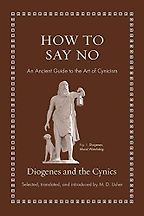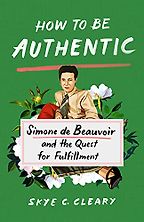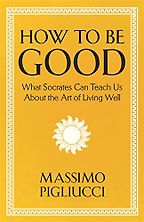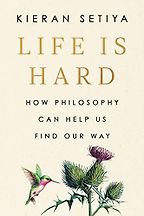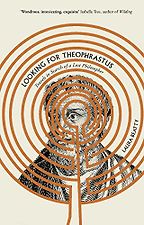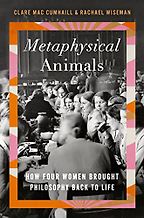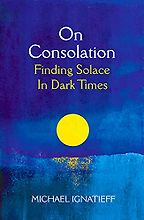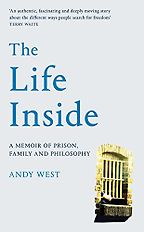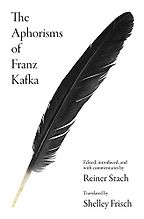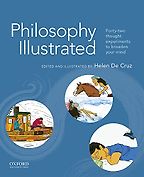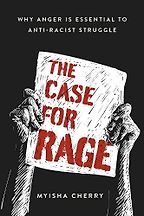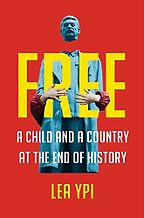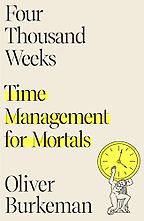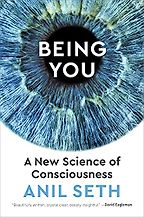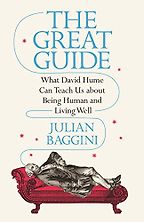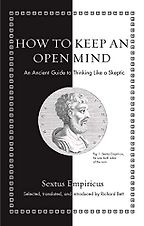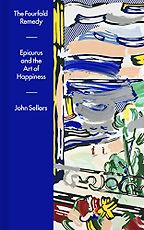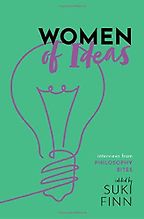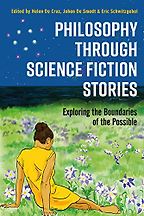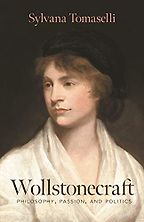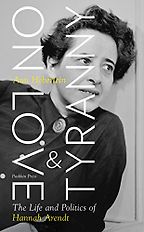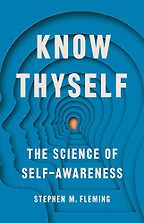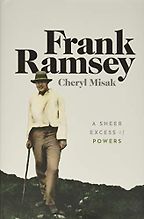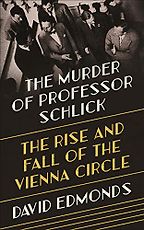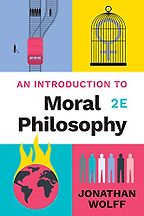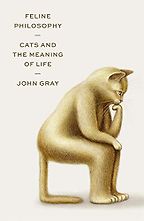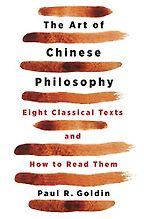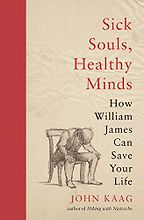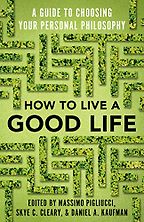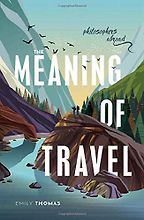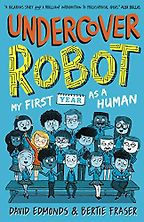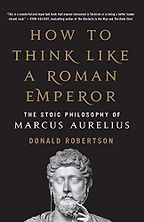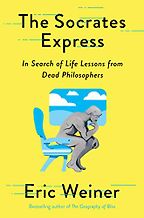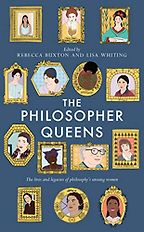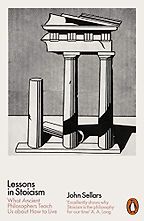New Philosophy Books
Last updated: December 12, 2024
Every year a slew of new philosophy books are published, works by or about everyone from Aristotle to Žižek, and covering subjects from aesthetics to Zen. But which ones are actually worth reading? Below we keep track of new philosophy books coming out, and try to pick out ones that we like the look of. In his interviews with philosophers, our philosophy editor Nigel Warburton asks them to recommend books by others. The list below helps us highlight books they've written themselves.
Open Socrates: The Case for a Philosophical Life
by Agnes Callard
A lively reinterpretation of the Socratic style of discussion by the always-interesting public philosopher Agnes Callard. For her the Socratic method is key to making progress in answering the most important questions we can ask about love, sex, death, and politics.
“Birch is a superbly clear writer, and he’s very careful to adjust his belief according to the evidence. He’s one of the most interesting public philosophers around today because of his willingness to engage with ideas which have a very broad interest across the world. He’s also adept at dissemination those ideas. By making his book freely available online he has guaranteed a wide readership. He appears on podcasts, radio, and television and is frequently interviewed, more often these days on the potential sentience of AI than on animals. But his deep interest is in sentience in animals.” Read more...
The Best Philosophy Books of 2024
Nigel Warburton, Philosopher
“The big theme of the book is not just trying to understand her family and the impact the suicides have had upon subsequent generations, but also how much better the ancient Greeks were at discussing the impact of suicide than our contemporary commentators, including philosophical commentators. Like all of Edith’s books, this is extremely easy to read, despite the subject matter. It oscillates between dark personal memoir and really illuminating discussions of passages of ancient Greek tragedy.” Read more...
The Best Philosophy Books of 2024
Nigel Warburton, Philosopher
“What I love about the book is she’s a great writer with a light touch. She finds ways of telling stories and relating ideas and thinkers and thoughts and social events that are completely compelling. This book has been very widely reviewed and universally praised. She’s just broken into the publishing world with this, and I expect she’ll write other biographies or philosophically-tinged books after this. It is a really significant debut and she is a writer to watch.” Read more...
The Best Philosophy Books of 2024
Nigel Warburton, Philosopher
Fear and Trembling: Dialectical Lyric
by Søren Kierkegaard and translated by Alexander Jech
Fear and Trembling by Søren Kierkegaard and translated by Alexander Jech is a very useful edition of this classic text. It includes extensive annotations at the back including elucidation of key terms together with relevant quotations from other works by Kierkegaard.
Marx
by Jaime Edwards and Brian Leiter
Marx is a jargon-free introduction to Marx and Marxist thought. It's very clear and readable.
The Invention of Good and Evil: A World History of Morality
by Hanno Sauer
The Invention of Good and Evil: A World History of Morality by Hanno Sauer, a moral philosopher at Utrecht University, is now available in English. The book has won prizes in Germany, and is well-written on an interesting subject: our morality and how it has evolved since we first evolved as a species (with a look into the future too).
Consider the Turkey
by Peter Singer
Philosopher Peter Singer on how turkeys are raised and how they die. This little book is intended to show why vegan alternatives to turkey are a good idea on humane grounds—it even includes meat-free recipes.
Third Millennium Thinking: Creating Sense in a World of Nonsense
Saul Perlmutter, Robert MacCoun and John Campbell
🎯 A bestselling book on Five Books in 2024
In Third Millennium Thinking: Creating Sense in a World of Nonsense a Nobel-prize winning physicist, a philosopher and a social scientist together give a clear, accessible and enlightening guide to the tools of thinking that make science work. This is a brilliant book by eminent thinkers in their fields who are also superb communicators. It's a really enjoyable read and a great book for anyone who wants to think more clearly about evidence, argument, reason and the need for a degree of intellectual humility.
“Third Millennium Thinking: Creating Sense in a World of Nonsense by Saul Perlmutter (a Nobel-prize winning astrophysicist), Robert MacCoun, (a social psychologist) and John Campbell (a philosopher) is a notable new addition to our list of books on critical thinking. According to Nigel Warburton, it’s ‘a clear, accessible and enlightening guide to the tools of thinking that make science work. It’s a really enjoyable read and a great book for anyone who wants to think more clearly about evidence, argument, reason and the need for a degree of intellectual humility.'” Read more...
Nonfiction Books to Look Out for in Early 2024
Sophie Roell, Journalist
Living on Earth: Life, Consciousness and the Making of the Natural World
by Peter Godfrey-Smith
Living on Earth is the third book in Australian philosopher Peter Godfrey-Smith's trilogy on the emergence of intelligence on Earth. (The other books are: Other Minds from 2018 and Metazoa in 2020).
We Are Free to Change the World: Hannah Arendt’s Lessons in Love and Disobedience
by Lyndsey Stonebridge
We Are Free to Change the World by Lyndsey Stonebridge is an excellent, well-written book that shows why Hannah Arendt is still an important and sometimes controversial thinker today.
“Diogenes famously thought that human beings don’t need much to be happy, and owned just a cloak and a stick—he had a cup too at first, but he threw that away when he saw a boy drinking water with his hands and realised he didn’t really need it. Diogenes allegedly lived in a barrel at the edge of the city of Athens. One of the things I like about this very short book by Roubineau is that he has four or five pages discussing whether Diogenes did actually live in a barrel. It was more likely a big clay storage jar, and he wasn’t unusual in that, actually.” Read more...
The Best Philosophy Books of 2023
Nigel Warburton, Philosopher
The Experience Machine: How Our Minds Predict and Shape Reality
by Andy Clark
The Experience Machine by cognitive philosopher Andy Clark is about predictive processing. This is the view that we construct our reality from expectations, and that our relationship with the world is active: we are never simply passive recipients of incoming data. Clark provides an engaging overview of the state of research and how predictive processing should change how we think about what we are.
“One of the trends is a huge number of books about philosophers’ lives. I’ve chosen two for my list…although I could equally have picked Robin Waterfield’s biography of Plato, Plato of Athens. That’s also a very good book.” Read more...
The Best Philosophy Books of 2023
Nigel Warburton, Philosopher
“The books in this series provide the important parts of the text in the original language, a translation on the facing page, as well as explanations of what it’s all about. Susan Sauvé Meyer of the University of Pennsylvania takes on the task in How to Flourish: An Ancient Guide to Living Well, which includes about a quarter of the text of The Nicomachean Ethics. This is not, I would say, an introductory book—it starts with a close look at the Greek word for living well, eudaimonia, and how best to translate it—but more a way to dip your toe into an important primary source without being overwhelmed.” Read more...
Notable Nonfiction of Early Summer 2023
Sophie Roell, Journalist
Humanly Possible: Seven Hundred Years of Humanist Freethinking, Inquiry, and Hope
by Sarah Bakewell
Humanly Possible is a book covering seven centuries of humanistic thought, written by one of the best philosophy writers for a general audience around, Sarah Bakewell. It's a brilliant book, done with Bakewell's characteristic elegance and intelligence.
Nasty, Brutish, and Short: Adventures in Philosophy with Kids
by Scott Hershovitz
Children often ask deep philosophical questions that can flummox parents. Philosopher and parent Scott Hershovitz shows how he discusses philosophy with his own children in this amusing and enjoyable book.
Why Veganism Matters
by Gary Francione
In Why Veganism Matters Gary Francione, a professor of law and philosophy at Rutgers University, argues that veganism is a moral imperative. He is a self-declared abolitionist when it comes to animal rights, and critical of the idea that we should focus on animal welfare, minimising their suffering and using humane methods of slaughter. Rather, he argues that we should abolish all uses of animals and stop treating them as chattels.
“What David Edmonds does so well is to show you that even though Derek Parfit was the great modern philosopher of selflessness—which has been foundational to the effective altruism movement and other modern philosophies—his philosophy was so closely associated with his personality. Edmonds is very good at explaining Parfit’s ideas, and doing so in a way that is not oversimplified, but which is also not the headache of reading Parfit’s original work. But the real achievement of the book is to show you how Parfit’s personality changed very significantly, and that embrace this question of, as he became more reclusive and obsessed with his work, did he—as some people say—become a cruel and selfish person who was willing to upset the people who loved him.” Read more...
The Best Intellectual Biographies
Henry Oliver, Biographer
The Art of Cycling: Philosophy, Meaning, and a Life on Two Wheels
by James Hibbard
James Hibbard, a former American professional cyclist, threads together the story of his cycling career, a road trip, and philosophy, which he studied and looked to for answers, but found inadequate. "Thinking, when divorced from the physicality of our existence, fails, " he says, "I very much felt that it failed me."
The Idea of Prison Abolition
by Tommie Shelby
The Idea of Prison Abolition is based on a series of lectures by Tommie Shelby, a professor of Philosophy and of African and African American Studies at Harvard. In a way, it's a response to the work of Angela Davis. Shelby is ultimately not on the side of prison abolition, but his exploration of the issue is well worth reading.
“This is a fun book, but also a serious book. Rebecca Roache is very much a philosopher, and this is really a book on the philosophy of language. It actually draws upon some of the ideas of J.L. Austin, who we’ve already mentioned, the ordinary language philosopher who talked about performative utterances, acts which are performed by saying words—so, for instance, launching a ship by saying ‘I launch this ship’. Or the words ‘I do’ in a marriage ceremony. These are linguistic acts. And one of the themes in Rebecca’s book is how linguistic acts are performed when people utter swear words in different contexts.” Read more...
The Best Philosophy Books of 2023
Nigel Warburton, Philosopher
“There was also Mark Rowe’s biography of another Oxford philosopher, J.L. Austin, which is excellent in many ways…What’s fascinating about Rowe’s biography is that he doesn’t just tell the story of J.L. Austin the philosopher, but also that of J.L. Austin the military intelligence expert. Rowe shows he played a significant role in preparing for the D-Day landings. He was a major figure in British intelligence during the Second World War before returning to Oxford and becoming a significant figure in the world of Ordinary Language Philosophy.” Read more...
The Best Philosophy Books of 2023
Nigel Warburton, Philosopher
Ethics in the Real World: 90 Brief Essays on Things That Matter
by Peter Singer
***🏆 A Five Books Book of the Year ***
“Also new in ethics books, there’s a “fully updated and expanded” version of Ethics in the Real World by Peter Singer, the Australian-American philosopher behind the effective altruism movement, one of our best philosophy books of 2016. These are short essays, mostly from Singer’s Project Syndicate column, addressing issues like: ‘Can Ethics Be Taught?’, ‘The Case for Going Vegan’ and ‘Why Google Was Wrong’ to fire James Damore for his comments about women in tech.” Read more...
Notable Nonfiction of Early Summer 2023
Sophie Roell, Journalist
Justice for Animals: Our Collective Responsibility
by Martha Nussbaum
Justice for Animals is a very clearly written and persuasive call to action on behalf of non-human animals by American philosopher Martha Nussbaum. After outlining the harm we're doing by using five specific examples (a mother elephant, a humpback whale, a fictional pig, a finch and a stray dog), she writes: "The extent of our own implication in practices that harm animals should make every person with a conscience consider what we can all do to change this situation. Pinning guilt is less important than accepting the fact that humanity as a whole has a collective duty to face and solve these problems." The impetus behind writing the book is also very affecting: it's because of her daughter, who was a passionate advocate for animals and died young. In the book, Nussbaum takes a 'capabilities approach' to develop a new theoretical basis for thinking about justice and injustice to animals as she feels "the dominant theories in this area are defective and that mine will direct action better."
Reality+: Virtual Worlds and the Problems of Philosophy
by David Chalmers
***🏆 A Five Books Book of the Year ***
“What David Chalmers wants to say is that the reality that we seem to experience if we see a table in front of us is in some important sense real: it’s not an illusion. That goes against the Cartesian way of seeing those imaginary or created worlds. That’s the main thrust of it. He’s very clever because he’s managed to then rehearse many of the key arguments that you would encounter in most philosophy courses, but through that lens of virtual reality. It genuinely is thought-provoking (or virtual thought-provoking). It’s well-written too.” Read more...
The Best Philosophy Books of 2022
Nigel Warburton, Philosopher
Aristotle: Understanding the World's Greatest Philosopher
by John Sellars
Aristotle: Understanding the World's Greatest Philosopher is the latest book by John Sellars, a Reader in Philosophy at Royal Holloway, University of London, who excels at writing short books for a general audience on ancient philosophy. For those of us not yet brave enough to embark on the Nicomachean Ethics, this 144-page book (just under four hours as an audiobook) is a great way into one of the greatest philosophers of all time.
Be Not Afraid of Life: In the Words of William James
by John Kaag, Jonathan van Belle & William James
This book is a selection of writings by William James, the 19th-century American intellectual who not only founded the school of philosophy known as Pragmatism and made a huge contribution to the emerging field of psychology, but was also very interested in the spiritual. He's relevant today because he asked some of the big questions about the value of life, freedom, and the experience of consciousness. The book is edited with an introduction by John Kaag (author of Sick Souls, Healthy Minds: How William James Can Save Your Life) and Jonathan van Belle.
Sophie’s World: A Graphic Novel About the History of Philosophy (Volume 1: Socrates to Galileo)
by Jostein Gaarder, Nicoby (illustrator) & Vincent Zabus
A graphic novel based on Jostein Gaarder's Sophie's World. It's updated (at the beginning Sophie and a friend are planning to meet at a climate protest) but also a bit more accessible than the original, which was a bestseller in the 1990s. While the original Sophie's World was written for teenagers, it's actually a little hard to understand unless you already know a bit about philosophy. This version, adapted by Belgian comics writer Vincent Zabus, presumes no knowledge and so is a good way for complete beginners to start out on philosophy.
How to Say No: An Ancient Guide to the Art of Cynicism
by Diogenes and the Cynics, translated by Mark Usher
***🏆 A Five Books Book of the Year ***
“This is a personal favorite. Diogenes was Plato’s contemporary, and a kind of performance artist. He lived a very frugal existence. He slept in a barrel—well, they say it was a barrel but it was actually probably an amphora—just outside Athens and had only a cloak as a possession. He originally had a wooden bowl to drink from as well but when he saw a boy drinking from a waterfall with his hands, he realized he didn’t need it and got rid of it. He famously masturbated and defecated in public and defied other conventions too.” Read more...
The Best Philosophy Books of 2022
Nigel Warburton, Philosopher
How to Be Authentic: Simone de Beauvoir and the Quest for Fulfillment
by Skye C Cleary
How to Be Authentic (called How to Be You: Simone de Beauvoir and the Art of Authentic Living in the UK edition) is an exploration of French philosopher and feminist Simone de Beauvoir (1908-1986) and her thinking about life and how to live it. It's an existentialist approach, which means enormous freedom but also responsibility. If you haven't read The Second Sex, the book is also useful for understanding Beauvoir's thinking on what it means to be a woman.
How To Be Good: What Socrates Can Teach Us About the Art of Living Well
by Massimo Pigliucci
How To Be Good: What Socrates Can Teach Us About the Art of Living Well is called The Quest for Character: What the Story of Socrates and Alcibiades Teaches Us about Our Search for Good Leaders in the US edition.
Looking for Theophrastus: Travels in Search of a Lost Philosopher
by Laura Beatty
***🏆 A Five Books Book of the Year ***
“Theophrastus was slightly younger than Aristotle and came to Plato’s Academy when Plato was quite an old man. Then, when Plato died, he traveled with Aristotle, and was involved in Aristotle’s non-philosophical projects looking very closely at the nature of the world: the biological world, the geological world and so on. Theophrastus is probably best known for a book called The Characters. It’s not really famous amongst philosophers, although he was a philosopher. The Characters consist of descriptions of types of people in terms of their psychological patterns of behavior and so on, which seem very modern. But what Laura Beatty has done is take the bare bones of his life—because not all that much is known about him—and made a literal journey through the places where Theophrastus lived and tried to understand more about him.” Read more...
The Best Philosophy Books of 2022
Nigel Warburton, Philosopher
Metaphysical Animals: How Four Women Brought Philosophy Back to Life
by Clare Mac Cumhaill & Rachael Wiseman
The story of four mid-20th century philosophers based in Oxford—Elizabeth Anscombe, Iris Murdoch, Philippa Foot and Mary Midgley. With many men who typically dominated academic philosophy away fighting World War II, they were able to make their own mark, arguing for a greater place for metaphysics in philosophical discourse.
On Consolation: Finding Solace in Dark Times
by Michael Ignatieff
In On Consolation Michael Ignatieff, historian, writer and former Canadian politician, looks at what we can learn from each across the millennia about how to deal with grief and pain. An atheist, Ignatieff nonetheless starts off with the Bible's Book of Job and the Psalms, before turning to Albert Camus, Anna Akhmatova, and Primo Levi.
The Life Inside: A Memoir of Prison, Family and Philosophy
by Andy West
***🏆 A Five Books Book of the Year ***
“Andy is a teacher of philosophy in prisons but he’s also somebody who’s had a lot of family experience in prisons from the inside, because his father, his uncle, and his brother, have all spent time in jail. So he’s got an ambivalent attitude to prisons and I think his family said, ‘What on earth are you going teaching in prisons for? That’s another one that ended up inside!’ He has a particularly interesting take on all this. It’s partly constructed memoir: he discusses the sessions where he teaches philosophy to prisoners, but for reasons of privacy, he hasn’t revealed too much about the identities of particular prisoners.” Read more...
The Best Philosophy Books of 2022
Nigel Warburton, Philosopher
The Aphorisms of Franz Kafka
by Franz Kafka, Reiner Stach & Shelley Frisch (trans.)
Franz Kafka's biographer, Reiner Stach, provides extensive commentary and explanations of the 100+ aphorisms the Czech writer composed while in Zürau (now Siřem in the Czech Republic) in 1917 and 1918. What's also very nice about this edition is that the aphorisms are provided both in the original German and in English translation. This is a book to read for a deeper understanding of Kafka and his thinking, rather than witty/universal quotes à la Nietzsche.
Philosophy Illustrated
by Helen De Cruz
Philosopher Helen De Cruz is a big believer in the power of pictures to make philosophy more accessible. In this book, she lays out 42 thought experiments with her own illustrations.
The Case for Rage: Why Anger Is Essential to Anti-Racist Struggle
by Myisha Cherry
***🏆 A Five Books Book of the Year ***
“Cherry’s argument is that the energy and the possibility of collective channelled action, inspired by rage, justifies this approach, and makes it superior to a more neutral response to something as outrageous as the cold-faced racism in Charlottesville, for instance.” Read more...
The Best Philosophy Books of 2021
Nigel Warburton, Philosopher
“Free does all the things you could ask of a family memoir plus at least one hundred more. You’ve got the finely drawn family portraits, the novelistic reimaginings of dialogue, the master antagonisms of history—and History with a capital ‘H’.” Read more...
The best books on Family History
Thea Lenarduzzi, Journalist
Four Thousand Weeks: Time Management for Mortals
by Oliver Burkeman
***🏆 A Five Books Book of the Year ***
“It’s a book about what we do with our limited time on Earth, how we decide to prioritise and proportion our time. To that extent it’s a book of ethics in the face of inevitable death. It’s a combination of sometimes witty, sometimes terrifying exploration of the human condition, and at the same time an antidote to those time management books that tell you how you can maximise your productivity, taking on more and more tasks and completing them efficiently.” Read more...
The Best Philosophy Books of 2021
Nigel Warburton, Philosopher
“It’s a book about the nature of consciousness, one of the most intractable problems that human beings have come across. How do we understand how we, as apparently material beings made of flesh and bone—and, in particular, millions of neurones—get to the position of having qualitative experience, through the experience of the world through our senses, reflection and experience? Beautifully written, easy to read, hard to put down. It’s passionate, and it’s not patronising.” Read more...
The Best Philosophy Books of 2021
Nigel Warburton, Philosopher
What Mental Illness Really Is… (and what it isn’t)
by Lucy Foulkes
Out in paperback and with a new title, What Mental Illness Really Is (and what it isn't), is by academic psychologist Lucy Foulkes. It's an important look at what we know about mental illness and what we don't, and a call to increase public understanding of mental health so that we're all better equipped to help people.
“This book is brilliant. It’s written by Samantha Rose Hill, who must know as much as anyone about Hannah Arendt. She’s dived into Arendt’s surviving papers, notebooks, and even poetry, spending many hours in the archive. And what’s so great about this as a biography is that Hill has done something that biographers rarely do—she’s been highly selective in what she’s included. As a result, we don’t get the feeling of being overwhelmed by details of an individual life but rather get to understand what really mattered.” Read more...
The Best Philosophy Books of 2021
Nigel Warburton, Philosopher
The Great Guide: What Hume Can Teach Us about Being Human and Living Well
by Julian Baggini
The Great Guide by Julian Baggini is a wonderful introduction to David Hume, the 18th century Scottish philosopher, and blends in his precepts and views with travelling in his footsteps and learning about his life. "Hume didn't just write about how to live," writes Baggini. "He modelled the good life."
How to Keep an Open Mind: An Ancient Guide to Thinking Like a Skeptic
by Richard Bett & Sextus Empiricus
How to Keep an Open Mind is a great primer on the ancient Greek philosophy of skepticism, put together by Richard Bett, a professor of philosophy and classics at John Hopkins University. A wonderful introduction puts the philosophy in context, comparing the ancient Greek or Pyrrhonist tradition of skepticism with what we mean when we describe someone as 'skeptical' today, and looking at what its value in the modern world might be.
As with all the books in the Ancient Wisdom for Modern Readers series, Bett then selects passages from Sextus Empiricus—the only Greek skeptic whose works have survived—and translates them, also providing the original Greek on facing pages.
The Fourfold Remedy: Epicurus and the Art of Happiness
by John Sellars
In The Fourfold Remedy John Sellars, who earlier wrote an excellent short book about Stoicism, introduces the philosophy of Epicurus. Contrary to our modern vision of someone with refined tastes in food and wine, Epicureans in the ancient world were mostly concerned with achieving tranquillity.
Women of Ideas: Interviews from Philosophy Bites
edited by Suki Finn
Women of Ideas is a collection of interviews with philosophers from the Philosophy Bites podcast. The interviews were selected and put together by Suki Finn, Lecturer in Philosophy at Royal Holloway, part of the University of London. It's a really fascinating collection, opening with an interview with Amia Srinivasan, Chichele Professor of Social and Political Theory at All Souls College, Oxford, on "What is a Woman?"
Philosophy through Science Fiction Stories: Exploring the Boundaries of the Possible
by Helen De Cruz, Johan De Smedt and Eric Schwitzgebel (editors)
Can you learn philosophy through science fiction? The authors of this book, Helen De Cruz, Johan De Smedt and Eric Schwitzgebel, think so. Eric also spoke to us about the best books on sci-fi and philosophy.
Wollstonecraft: Philosophy, Passion, and Politics
by Sylvana Tomaselli
In Wollstonecraft: Philosophy, Passion, and Politics, Cambridge intellectual historian Sylvana Tomaselli takes a holistic approach to the thinking of Mary Wollstonecraft, arguing that she should be remembered as much more than just the author of A Vindication of the Rights of Woman. Writing in the aftermath of the French Revolution, Wollstonecraft, though entirely self-educated, was a serious thinker. "Like many of her contemporaries, she sought to understand the circumstances that led to the stupendous events defining her time, but more than most she weighed the ethical choices they forged on those witnessing them," Tomaselli writes. Wollstonecraft was a prodigious writer, who earned her living by her pen, but died much too young, after giving birth to her second child (Mary, who would later write Frankenstein).
On Love and Tyranny: The Life and Politics of Hannah Arendt
by Ann Heberlein and Alice Menzies (translator)
A translation of Swedish writer Ann Heberlein's 2020 biography of Hannah Arendt, the German-born Jewish political philosopher, interweaving her philosophy with the tumultuous events of her life. The Swedish reviews of the book have been mixed, but anything about Hannah Arendt is hard to resist.
Know Thyself: The Science of Self-Awareness
by Stephen Fleming
Know Thyself: The Science of Self-Awareness by cognitive neuroscientist Stephen Fleming is a scientific, philosophical, and practical book that sheds lights on 'metacognition'—our thoughts about thoughts and the importance of self-awareness to almost anything we embark on.
“This is a fantastic biography. Frank Ramsey was an extraordinary character, evidently brilliant from an early age. He made path-breaking advances in mathematics, philosophy and economics. In his spare time, he helped Keynes edit the Economic Journal, he translated Wittgenstein into English because nobody else could understand what Wittgenstein was saying. And he was a larger-than-life character who hung out with the Bloomsbury Group and had an extraordinary life, and who then died tragically young at the age of 26.” Read more...
The Best Economics Books of 2020
Diane Coyle, Economist
The Murder of Professor Schlick: The Rise and Fall of the Vienna Circle
by David Edmonds
***🏆 A Five Books Book of the Year ***
“What David has managed to do is combine the biographical and historical with the philosophical, without getting too technical. A lot of the philosophy of the Vienna Circle was quite hard core, but he doesn’t get bogged down in the details. This is a book that’s accessible to a general reader. He’s very good about making clear what the importance of the debates they were having was, what their limitations were, why they were or were not influential, as well as telling these stories which connect very strongly with the rise of Nazism, including the murder of the title of the book.” Read more...
The Best Philosophy Books of 2020
Nigel Warburton, Philosopher
An Introduction to Moral Philosophy
by Jonathan Wolff
The new, second edition of Jonathan Wolff's introduction to moral philosophy, using real life examples. Our interview with Jonathan Wolff, about political philosophy books, is one of the most popular on our site.
Feline Philosophy: Cats and the Meaning of Life
by John Gray
Lots of fans of cats and British philosopher John Gray will be delighted to hear that he's devoted a whole book to them. In his interview with us, Gray recommended books on 'critiques of utopia and apocalypse.'
The Art of Chinese Philosophy: Eight Classical Texts and How to Read Them
by Paul Goldin
The Art of Chinese Philosophy by Paul Goldin is a great introduction to Eastern philosophy, so often neglected in university philosophy courses. The writings attributed to eight Chinese thinkers are examined and explained, covering Confucianism and Daoism and including Sunzi, author of The Art of War, one of our most recommended books on Five Books.
Sick Souls, Healthy Minds: How William James Can Save Your Life
by John Kaag
William James, one of the founders of pragmatism and empirical psychology, struggled with the question of what made life worth living. In this book, philosopher John Kaag—who spoke to us about the best books of American philosophy—explains how James's ideas can help those of us who struggle with the same question.
How to Live a Good Life: A Guide to Choosing Your Personal Philosophy
by Daniel Kaufman, Massimo Pigliucci & Skye C Cleary
The ancient philosophers spent a lot of their time thinking about the best way to live. Modern philosophy is often more esoteric, but in many popular philosophy books coming out now, that ancient tradition is making a comeback. There are modern practitioners embracing Stoicism, Epicureanism, secular Buddhism and more. In How to Live a Good Life: A Guide to Choosing Your Personal Philosophy, philosophers Skye Cleary, Massimo Pigliucci and Dan Kaufman gather together essays by 15 thinkers, with each presenting the philosophy they've chosen to guide their lives.
“She’s taken a series of topics from the history of travel, from the 17th century onwards, and showed why this is a really interesting and important area for philosophers to consider…Emily combines a personal voice with highly informative, well-researched glimpses of particular philosophical travellers. And she’s pulled off a really good book that is directed at the general public. It’s accessible and it’s entertaining, but also opens up interesting philosophical ideas. It’s very original.” Read more...
The Best Philosophy Books of 2020
Nigel Warburton, Philosopher
Undercover Robot: My First Year As Human
by Bertie Fraser & David Edmonds
Undercover Robot is a very funny introduction to the ethics of artificial intelligence and of being a human being. Dave Edmonds, who recommended the best books on ethical problems for Five Books, and Bertie Fraser, founder of Storynory.com, do a brilliant job of bringing to life Dotty, who is trying her best to fit in as normal 12-year old girl, but can't help being weird. A children's book, yes, but quite fun to read as an adult too.
How to Think Like a Roman Emperor: the Stoic Philosophy of Marcus Aurelius
by Donald Robertson
"How to Think Like a Roman Emperor is a philosophical biography of Marcus Aurelius, using key moments in the emperor’s life to introduce readers to the principles and practice of Stoicism, updated on the basis of the author’s experience as a cognitive behavioural therapist”—Massimo Pigliucci, Professor of Philosophy at the City College of New York and practising Stoic, in his 2020 update on the best books on Stoicism.
The Socrates Express: In Search of Life Lessons from Dead Philosophers
by Eric Weiner
"‘Socrates’ is a stand-in for the kind of philosophy that I was interested in, that I write about, which is a practical, therapeutic, accessible philosophy. It was Cicero who famously said of him that he called philosophy down from the heavens and introduced it into people’s homes. That’s what I’m trying to do."
Bestselling author Eric Weiner talked to our philosophy editor, Nigel Warburton, about 'Life-Changing Philosophy Books'
The Philosopher Queens: The lives and legacies of philosophy's unsung women
by Lisa Whiting & Rebecca Buxton
***🏆 A Five Books Book of the Year ***
“This is the book of the year for me. Rebecca Buxton and Lisa Whiting are both graduate students in philosophy and they’ve co-edited this amazing book, which is basically the book that they wish had existed when they started thinking about studying philosophy. It’s a book that has 20 short essays about significant women philosophers. It’s skewed towards political philosophy and ethics, which is where their interests lie, but not exclusively, and it goes from ancient Greece to more or less the present day. It’s a selection of philosopher queens, women philosophers who’ve been neglected by mainstream curricula in philosophy. It’s also an illustrated book, which is unusual in philosophy.” Read more...
The Best Philosophy Books of 2020
Nigel Warburton, Philosopher
Lessons in Stoicism: What Ancient Philosophers Teach Us about How to Live
by John Sellars
"Here, in around 80 pages, Sellars gives a lucid, easy-to-follow account of what Stoicism as a way of life amounts to, and how you might start to put it into practice."
Our philosophy editor Nigel Warburton's review of Lessons in Stoicism:
-

1
Humanly Possible: Seven Hundred Years of Humanist Freethinking, Inquiry, and Hope
by Sarah Bakewell -

2
The Dangerous Life and Ideas of Diogenes the Cynic
by Jean-Manuel Roubineau, Malcolm DeBevoise & Phillip Mitsis -

3
Parfit: A Philosopher and His Mission to Save Morality
by David Edmonds -

4
The Experience Machine: How Our Minds Predict and Shape Reality
by Andy Clark -

5
For F*ck's Sake: Why Swearing is Shocking, Rude, and Fun
by Rebecca Roache
The Best Philosophy Books of 2023, recommended by Nigel Warburton
The Best Philosophy Books of 2023, recommended by Nigel Warburton
The genre of philosophical biography is flourishing, as we pay attention not only to what philosophers said and wrote but also to how they lived and the intellectual context in which they developed their ideas. Nigel Warburton, our philosophy editor, picks out some of the best philosophy books of the year, from the man who lived in a storage jar in 5th century Athens to the latest contributions of cognitive science to our understanding of how we experience the world. Read more philosophy book recommendations on Five Books
